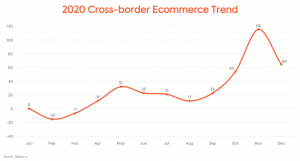One of the main themes of coronavirus from a business viewpoint has been the massive boost to ecommerce. As lockdowns have forced many people to shop online rather than visit stores and the lack of opportunities to go out has meant the majority have had a little extra money, we have seen ecommerce sales sky rocket. Indeed, 2020 saw ecommerce sales surpass £220 billion and cross border sales rise 57%. With lockdowns looking likely to be around for a while longer and more people participating in ever before, there has never been a better time for you to invest in your ecommerce channels. Here are 5 things that you should bear in mind when adapting your ecommerce system for 2021.

Source: https://ecommercenews.eu/cross-border-ecommerce-in-uk-up-57/
1) Omnichannel Selling A Must
The rise in ecommerce has coincided with consumers accessing products from more channels than ever before. One example of this is the sheer number of devices people are now using to access products. It is no longer enough for you just to have a desktop website, as people will use mobile phones, tablets, voice controlled products and even televisions to access your products. Indeed, 30% of online shoppers are likely to abandon their carts in the middle of shopping if they find out that your website is not mobile-friendly.
It’s not just consumers’ devices that are diverse though, it is also the places that they are finding products. Consumers will now use a combination of your website, social media and elsewhere to access your products, so it is worth getting your products visible in as many places as possible. This brings us nicely on to the next tip…
2) Make The Most Of Marketplaces
The competition online is just as fierce as it is on the high street. That means that you need to ensure your customers buying experience is as easy as possible. Companies such as Amazon and Walmart have the experience and infrastructure required to satisfy today’s customers. Furthermore, other niche marketplaces such as Etsy continue to grow to accommodate new digital entrepreneurs.
These marketplaces also have incredible delivery capabilities that you can take advantage of. Thus, you should definitely have listings on marketplaces in order to diversify your channels for success in 2021’s ecommerce. If you are currently selling on marketplaces, or planning on doing so soon, read our article here that details all the recent changes sellers on Marketplaces face.
3) New Technology
Part of the reason that online marketplaces are so good is that they have access to all the newest ecommerce technology which can be vital in maximising your sales. One such technology is Artificial intelligence (AI), which acts as your online in-store associate by offering personalized guidance and recommendations to your customers. AI uses shoppers’ past purchase history and browsing behaviour to show them products they are more likely to purchase.
It is also likely that analytics capabilities will grow in 2021, enabling you to have a clear picture as to what your customers want and when and how they want it. You should definitely not shy away from implementing new technology to your site this year.
4) New Payment Methods
The technology of payment methods is moving rapidly. As of now, most ecommerce businesses accept digital wallets (like Google Pay, Samsung or Apple Pay, and PayPal) apart from debit and credit cards. However, ecommerce in 2021 will see even more services become popular.
Services such as Klarna which offer buy-now pay-later services are becoming increasingly popular. We might even see customers lean slightly more towards cryptocurrencies. Cryptocurrencies, especially Bitcoin, have many benefits for online shop owners, such as low transaction fees and no reverse transactions.
5) Don’t Forget Brexit
The implications of Brexit will be one of the major obstacles facing ecommerce sellers this year. Most obviously, this will be because of the new customs procedures making cross-border commerce more difficult. On top of this, the UK have implemented new rules on selling through online marketplaces (rules which the EU will also be implementing in July 2021) which you will need to adhere to.
Luckily, we’ve got you covered, you can check out our guides on importing and exporting post-Brexit to give you an idea of what you need to do in order to expand your business, and get you selling overseas as quickly as possible.
At J&P, we have the qualifications and knowledge to help you plan ahead, so please do not hesitate to get in touch should you have any further questions about selling on online marketplaces, or if you need any help with adapting your business to comply with the new post-Brexit legislation. You can contact us at enquiries@jpaccountant.com, on our social media, or give us a call on 0161 637 1080.
